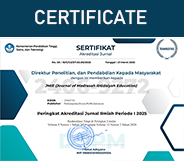PENERAPAN PEMBELAJARAN E-LEARNING DAN PENGARUHNYA TERHADAP SELF REGULATED LEARNING MATEMATIS SISWA SEKOLAH DASAR
Abstract
Self regulated learning merupakan salah satu aspek afektif yang diharapkan dimiliki oleh setiap siswa. Tujuan dari penelitian ini adalah untuk menganalisis dan mengetahui self regulated learning atau kemandirian belajar matematika siswa ketika diberikan pembelajaran e-learning. Seiring dengan perkembangan zaman dan e-learning sudah semakin dikenal masyarakat luas, bahkan penggunaannya pun tidak hanya pada sekolah menengah, namun sekolah dasar. Penggunaan e-learning perlu kesadaran yang tinggi oleh siswa untuk melaksanakan pembelajaran. Maka pada artikel ini peneliti membuat website yang dirancang untuk anak pelajari dan mengaksesnya. Sehingga peneliti akan tahu anak yang mengakses pembelajaran dan tidak. Metode yang digunakan dalam penelitian ini adalah mix method (Kuntitatif dan kualitatif), dengan desain yang digunakan adalah pre test-post test control group design. Populasi dalam penelitian ini adalah siswa sekolah dasar yang berada di wilayah Jakarta, sedangkan yang menjadi sampel dalam penelitian ini adalah dua kelas dari keseluruhan populasi yang dipilih. Instrumen yang digunakan dalam penelitian ini berupa observasi, kuesioner, dan dokumentasi. Hasil penelitian menunjukkan bahwa “Self regulated learning siswa yang menggunakan e-learning lebih baik dari pada siswa yang pembelajarannya menggunakan media power point”. Hal tersebut ditunjukkan dengan nilai sig (2-tiled) sebesar 0,000, lebih kecil dari 0,05. Artinya jika nilai sig < 0,05 maka hipotesis H0 ditolak dan H1 diterima. Berdasarkan hasil penelitian tersebut dapat disimpulkan bahwa pembelajaran e-learning berpengaruh terhadap Self regulated learning matematika siswa sekolah dasar.
Keywords
Full Text:
PDFReferences
Arya, G. S. N. (2019). Pengembangan Konten E-Learning Berbasis Self Regulated Learning Untuk Mata Pelajaran Ips Kelas Viii Di Smp Laboratorium Undiksha. Jurnal Teknologi Pembelajaran Indonesia, 9(1). https://doi.org/10.23887/jtpi.v9i1.2888
Boekaerts, M. (1996). Self-regulated Learning at the Junction of Cognition and Motivation. European Psychologist, 1(2), 100–112. https://doi.org/10.1027/1016-9040.1.2.100
Boekaerts, M., & Corno, L. (2005). Self-regulation in the classroom: A perspective on assessment and intervention. In Applied Psychology (Vol. 54, Issue 2, pp. 199–231). https://doi.org/10.1111/j.1464-0597.2005.00205.x
Boticki, I., Baksa, J., Seow, P., & Looi, C. K. (2015). Usage of a mobile social learning platform with virtual badges in a primary school. Computers and Education, 86, 120–136. https://doi.org/10.1016/j.compedu.2015.02.015
Bozkurt, A., Karakaya, K., Turk, M., Karakaya, Ö., & Castellanos-Reyes, D. (2022). The Impact of COVID-19 on Education: A Meta-Narrative Review. TechTrends, 66(5), 883–896. https://doi.org/10.1007/s11528-022-00759-0
Byrnes, J. P., Miller, D. C., & Reynolds, M. (1999). Learning to make good decisions: A self-regulation perspective. Child Development, 70(5), 1121–1140. https://doi.org/10.1111/1467-8624.00082
Chemers, M. M., Hu, L. T., & Garcia, B. F. (2001). Academic self-efficacy and first-year college student performance and adjustment. Journal of Educational Psychology, 93(1), 55–64. https://doi.org/10.1037/0022-0663.93.1.55
Cidral, W. A., Oliveira, T., Di Felice, M., & Aparicio, M. (2018). E-learning success determinants: Brazilian empirical study. Computers and Education, 122, 273–290. https://doi.org/10.1016/j.compedu.2017.12.001
Hargittai, E., & Hsieh, Y. li P. (2010). Predictors and consequences of differentiated practices on social network sites. Information Communication and Society, 13(4), 515–536. https://doi.org/10.1080/13691181003639866
Isyarotullatifah, I. (2019). Pengembangan Konten E-Learning Ips Berbasis Self Regulated Learning. Jurnal Visi Ilmu Pendidikan, 11(2), 1. https://doi.org/10.26418/jvip.v11i2.34488
Jahnke, I., & Kumar, S. (2014). Digital Didactical Designs: Teachers’ Integration of iPads for Learning-Centered Processes. Journal of Digital Learning in Teacher Education, 30(3), 81–88. https://doi.org/10.1080/21532974.2014.891876
Janssen, M. (2011). Ervaringen met het Gebruik van Sociale Media in het Voortgezet Onderwijs. Proceedings NIOC 2011, September, 2–7.
Junco, R. (2012). The relationship between frequency of Facebook use, participation in Facebook activities, and student engagement. Computers and Education, 58(1), 162–171. https://doi.org/10.1016/j.compedu.2011.08.004
Khamparia, A., & Pandey, B. (2017). Impact of interactive multimedia in E-learning technologies: Role of multimedia in E-learning. Enhancing Academic Research With Knowledge Management Principles, April, 199–227. https://doi.org/10.4018/978-1-5225-2489-2.ch007
Kirschner, P. A., & Karpinski, A. C. (2010). Facebook® and academic performance. Computers in Human Behavior, 26(6), 1237–1245. https://doi.org/10.1016/j.chb.2010.03.024
Lane, S. D., Lewis, T. N., & Rd, W. C. (2011). The “ Digital Divide ,” Social Media , and Education-Related Outcomes. The Online Journal of New Horizons in Education, 3(2), 39–50. http://www.tojned.net/
Paul, J. A., Baker, H. M., & Cochran, J. D. (2012). Effect of online social networking on student academic performance. Computers in Human Behavior, 28(6), 2117–2127. https://doi.org/10.1016/j.chb.2012.06.016
Pintrich, P. R. (2000). The Role of Goal Orientation in Self-Regulated Learning. Handbook of Self-Regulation, 451–502. http://www.sciencedirect.com/science/article/pii/B9780121098902500433
Pintrich, P. R., Smith, D. A. F., Garcia, T., & Mckeachie, W. J. (1993). Reliability and Predictive Validity of the Motivated Strategies for Learning Questionnaire (Mslq). Educational and Psychological Measurement, 53(3), 801–813. https://doi.org/10.1177/0013164493053003024
Raza, N. (2017). Pengaruh Self-Regulated Learning Terhadap Persepsi Siswa Mengenai Tugas Akademik Pada Siswa. Psikoborneo: Jurnal Ilmiah Psikologi, 5(3), 397–403. https://doi.org/10.30872/psikoborneo.v5i3.4426
Roblyer, M. D., McDaniel, M., Webb, M., Herman, J., & Witty, J. V. (2010). Findings on Facebook in higher education: A comparison of college faculty and student uses and perceptions of social networking sites. Internet and Higher Education, 13(3), 134–140. https://doi.org/10.1016/j.iheduc.2010.03.002
Ruth Colvin Clark, & Richard E. Mayer. (2016). E-learning and the science of instruction: Proven guidelines for consumers and designers ofmul- timedia learning.
Stec, M., Smith, C., & Jacox, E. (2020). Technology Enhanced Teaching and Learning: Exploration of Faculty Adaptation to iPad Delivered Curriculum. Technology, Knowledge and Learning, 25(3), 651–665. https://doi.org/10.1007/s10758-019-09401-0
Van Gennip, H., & Van Kessel, N. (2011). Didactiek in balans 2011.
DOI: http://dx.doi.org/10.32934/jmie.v6i2.457
Refbacks
- There are currently no refbacks.

This work is licensed under a Creative Commons Attribution 4.0 International License.
Copyright © 2017, JMIE: Journal of Madrasah Ibtidaiyah Education, p-ISSN: 2580-0868, e-ISSN: 2580-2739
Indexed By:





